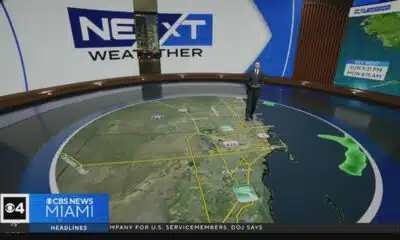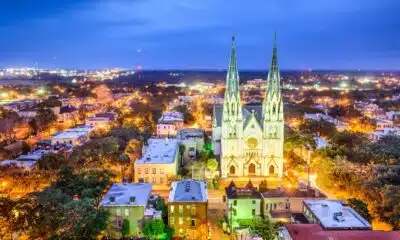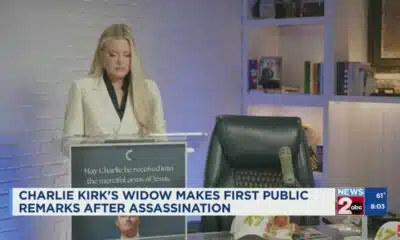News from the South - North Carolina News Feed
Split-ticket voting during NC elections has long been commonplace
North Carolina voters are partial to purple — in a political sense, at least. In last year’s statewide elections, they opted for six Democratic and eight Republican outcomes. While Republican President Donald Trump carried the state by three points, voters also chose Democrats Josh Stein for governor and Jeff Jackson as attorney general. Republicans and Democrats also split victory spoils in Council of State and statewide judicial races. In fact, no state was more split than North Carolina.
Split-ticket voting, or choosing different parties for different offices, is not a new trend in North Carolina. In the past half century, voters have chosen a governor of one party and a president of another in eight of 13 elections as well as different parties for senator and governor in six of eight elections.
[Subscribe for FREE to Carolina Public Press’ alerts and weekend roundup newsletters]
But in an increasingly nationalized political scene, the purple pattern gets more peculiar.
“It seems like North Carolina is the exception to the rule,” said Chris Cooper, a political science professor at Western Carolina University. “Almost everywhere else in America, there’s no ticket splitting.”
Split decisions
In a sense, the impetus of North Carolina’s ticket-splitting culture may be geography.
As a peripheral southern state, North Carolina has found itself caught between the political ideologies of the North and South throughout history, Cooper said.
“The South was overwhelmingly Democratic,” he explained. “We were not as Democratic as our southern neighbors, and when the South went overwhelmingly Republican, we didn’t go quite as Republican as our neighbors. We’re sort of sitting somewhere in the middle.”
After the South switched to Republican support, rural North Carolina Democrats held on to power in some offices. But that’s also changed. Now, rural North Carolinians tend to vote Republican while urban voters lean Democratic.
While the environment that originally allowed the state’s ticket-splitting culture to develop is history, there are several newer factors that continue the trend.
For one, North Carolina is among the fastest-growing states, with steady growth since the 1990s, Carolina Demography Director Nathan Dollar said. Most of that growth comes from people moving to North Carolina from other states and countries — 47% of the population was born out of state, including a 9.3% foreign-born population.
They come here largely from Florida, New York and South Carolina, Dollar said, and tend to gravitate towards urban areas. They include younger people, who are more likely to register unaffiliated, and older, wealthy retirees. And they naturally bring different cultural norms and political ideologies with them.
Those moving to North Carolina for jobs may have more formal education, which is sometimes a trait of split-ticket voters, according to Cooper. But besides that, he said there doesn’t seem to be any major demographic patterns of split-ticket voters.
Republican state Rep. Harry Warren sees the impacts of growth in his Rowan County district, which has a history of Scottish and Irish immigration.
“You have people from different nationalities that came into the state and are bringing with them their personal histories and experiences,” Warren said. “And I think it’s just a carryover generationally, as people pass down their values and their beliefs from one generation to the next.”
One of the biggest stories in state politics — and a significant contributor to North Carolina being purple — is the rise of unaffiliated voters. Since Republicans opened their primaries to unaffiliated voters in 1988, unaffiliated registration has steadily increased (Democrats subsequently opened their primaries in 1996).
“I think that probably leads to a little bit more ticket splitting as well because these are people that are not moored to a party in the way that a registered Democrat or registered Republican might be,” Cooper said.
In 2018, unaffiliated voter registration surpassed Republican registration; it later overtook Democratic registration in 2022. Now, 38% of registered voters are unaffiliated. These unaffiliated voters are disproportionately younger and from out-of-state. Warren said that likely reinforces the purpleness of the state.
North Carolinians’ desire to vote in a more purple way led to the elimination of the straight ticket option in a 2013 election omnibus bill sponsored by Warren. Eliminating the option meant that North Carolina voters could no longer check a box at the top of their ballots to automatically vote for all the Democratic or Republican candidates; they had to fill out each race separately.
“It encourages people then to go out and learn about the candidates and evaluate the candidates on the basis of their policies and what they’re proposing, rather than just arbitrarily voting for a party right down the line,” Warren said.
A ‘blue dot in a red city’
Canton Mayor Zeb Smathers is a Democrat, but he’s “not one of those,” according to his majority Republican constituents.
Growing up with a father and grandfather heavily involved in politics, Smathers was taught to qualify his Democratic identity; he was a “North Carolina Democrat” or a “Jim Hunt Democrat.” That is to say, more moderate than the national Democratic Party.
While most Canton elections are technically nonpartisan, with no “D” or “R” next to candidates’ names, Smathers is a “blue dot in a red city.” Republicans hold every seat on the Haywood County Board of Commissioners and Canton went for Trump by a 34-point margin in the 2024 election.
But no Republican challenged Smathers in his 2017 and 2021 mayoral races.
That makes sense to Smathers; so much of local government is practical leadership, or “getting things done.” People judge him and his team based on their accomplishments, not their party affiliation.
In Canton, that’s meant leading the community through the aftermath of 2021’s Tropical Storm Fred, a subsequent paper mill closure and, now, Helene recovery.
After Helene hit, there was a decision made among local leaders, Smathers recalled.
“We knew how toxic the political climate was, and so it’s not saying everyone always agrees, but all of us have made a really strong effort to make this bipartisan in some regards,” Smathers said. “We want that to be one of the lasting legacies of all these crises that we have faced in Canton.”
North Carolinians often split their ticket along federal and state lines. That tracks for Smathers.
If he ever gets criticized, it’s usually for something the national Democratic Party did, he said.
“I think out here, even ones who didn’t vote for him, I think people respect (former Democratic Gov.) Roy Cooper, I think people are thinking Josh Stein’s doing a good job…They view myself, people like Gov. Stein, differently than people at the national level.”
Democracy at work
States like North Carolina tend to get a lot of attention — in the form of candidate visits and ad spending — during presidential election years. In the past three presidential elections, North Carolina has been among the top three most-visited states.
Does that translate to special political favors from national politicians? Not really, Western Carolina’s Cooper said.
However, being a split-ticket state does have some other political reverberations. It forces candidates running for statewide office to make broader appeals to a more diverse electorate, Warren said.
And it pushes people like Stein, faced with a majority Republican legislature, to include and acknowledge the GOP in task forces and speeches.
But while splitting the ticket may appear to encourage politicians to reach across the aisle, at least rhetorically, it doesn’t necessarily lead to more moderate policy, Western Carolina’s Cooper said.
“In a close state, when you get power, you try to use it quickly, and so they tend to act with haste more often,” he said. “So actually you see, in some ways, less moderate actions in closer states because they know they have to act right then or else they might lose power.”
This session’s Senate Bill 58 is a prime example of that type of policy, according to Democracy NC Policy Director Katelin Kaiser.
Senate Bill 58, presented by a Republican-led legislature, would bar the attorney general, a newly-elected Democrat, from filing litigation against any presidential executive order.
Kaiser sees the move as trying to “undermine certain choices of voters.”
“Seeing split tickets in North Carolina, that is North Carolinians’ choice to be able to have and decide,” she said. “And so if they want a Republican president and they want a Democratic attorney general, that is, I think … democracy working.”
This article first appeared on Carolina Public Press and is republished here under a Creative Commons license.
The post Split-ticket voting during NC elections has long been commonplace appeared first on carolinapublicpress.org
News from the South - North Carolina News Feed
NC Courage wins 2-1 against Angel City FC
SUMMARY: The North Carolina Courage defeated Angel City FC 2-1 in Cary, ending their unbeaten streak. Monaca scored early at the 6th minute, followed by Bull City native Brianna Pinto’s goal at the 18th minute, securing a 2-0 halftime lead. Angel City intensified in the second half, scoring in the 88th minute, but the Courage held firm defensively to claim victory. Pinto expressed pride in the win, emphasizing the team’s unity and playoff ambitions. Nearly 8,000 fans attended. Coverage continues tonight at 11, alongside college football updates, including the Tar Heels vs. Richmond game live from Chapel Hill.
Saturday’s win was crucial for the Courage as the regular season starts to wind down.
https://abc11.com/post/north-carolina-courage-wins-2-1-angel-city-fc/17810234/
Download: https://abc11.com/apps/
Like us on Facebook: https://www.facebook.com/ABC11/
Instagram: https://www.instagram.com/abc11_wtvd/
Threads: https://www.threads.net/@abc11_wtvd
TIKTOK: https://www.tiktok.com/@abc11_eyewitnessnews
News from the South - North Carolina News Feed
Is nail gel actually harmful? It's complicated
SUMMARY: Gel nail polishes were recently banned in the EU due to the chemical TPO, which helps the gel harden under UV light. Concerns stem from studies showing potential reproductive risks in rats fed TPO, but humans aren’t exposed this way. The margin of exposure calculated for TPO is very high (1,515), suggesting it’s safe for people. More significant risks come from UV light used to cure nails, which may contribute to skin cancer over time. To stay safe, consider applying sunscreen before your salon visit and discuss toxin-free polish options with your aesthetician. Ultimately, balanced caution is key.
Certain gel nail polishes are no longer widespread in Europe as a chemical was banned due to potential health risks with long-term exposure. But a closer look at the study prompts some questions.
News from the South - North Carolina News Feed
What we know about Charlie Kirk shooting suspect, how he was caught
SUMMARY: Tyler Robinson, 22, from Utah, is in custody as the suspect in the shooting death of conservative activist Charlie Kirk at Utah Valley University. Robinson’s father identified him and convinced him to surrender after family members reported his possible involvement and negative comments about Kirk. Authorities believe Robinson acted alone. Investigators linked Robinson to the crime through Facebook posts and messages retrieved with help from his roommate. Robinson was arrested after fleeing the scene post-shooting. A rifle was found nearby. Charges are expected within three days. Officials praised coordination among police and government agencies in the swift arrest.
Authorities have taken into custody the person they suspect of shooting and killing conservative activist Charlie Kirk on …
-
News from the South - North Carolina News Feed7 days ago
Reagan era credit pumps billions into North Carolina housing | North Carolina
-
News from the South - Alabama News Feed7 days ago
Amid opposition to Blount County medical waste facility, a mysterious Facebook page weighs in
-
News from the South - South Carolina News Feed7 days ago
South Carolina’s Tess Ferm Wins Miss America’s Teen 2026
-
News from the South - Kentucky News Feed7 days ago
3 states push to put the Ten Commandments back in school – banking on new guidance at the Supreme Court
-
Local News7 days ago
Duke University pilot project examining pros and cons of using artificial intelligence in college
-
Mississippi News Video6 days ago
Interview: Come see Baptist at WTVA Senior Health Fair
-
News from the South - Missouri News Feed6 days ago
1587 Prime gives first look at food, cocktail menu ahead of grand opening in KC
-
News from the South - Arkansas News Feed5 days ago
‘One Pill Can Kill’ program aims to reduce opioid drug overdose












































